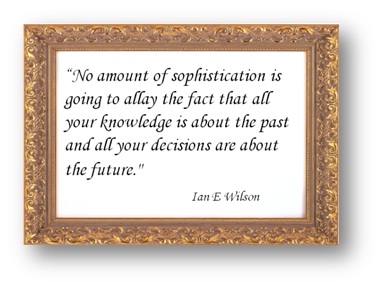(A sneak preview of my upcoming column in Inside Knowledge Magazine - August edition)
Counterfeit money and an art gallery.
The plot from a Bond film? Possibly, Moneypenny but it’s also part of an activity for engaging senior managers in thinking about knowledge management....
Here’s how it works. First, print off a large number of miniature £50 notes. Make sure that they really are miniature, and only printed on one side of the paper, or you might find yourself facing an extended period of reflection time at Her Majesty’s pleasure...
Next, chose a selection of 10-20 quotations which relate to knowledge management, organisational learning – whatever your focus is. David Gurteen’s website is a good source of these. Paste each quote into a PowerPoint slide of an empty, ornate picture frame, and print them off on A3 paper. This is your art collection, ready for auction. Put them up around the walls of your meeting room, and give the “frames” a quick coat of spray adhesive. Now you’re ready to go.

 Give each of the senior manager three £50 notes and inform them that they need to peruse the gallery and identify some ‘artwork’ to hang in the office. They are choosing the quotations which are most relevant to their part of the organisation. They can bid on up to three of the paintings by placing their money to the sticky picture frame. After five minutes or so, you will have a clear idea of which quotations were most resonant with the group. Some of the frames will be covered with £50 notes. This is all so much more fun than the usual facilitation favourites: Post-it™ notes and sticky dots!
Give each of the senior manager three £50 notes and inform them that they need to peruse the gallery and identify some ‘artwork’ to hang in the office. They are choosing the quotations which are most relevant to their part of the organisation. They can bid on up to three of the paintings by placing their money to the sticky picture frame. After five minutes or so, you will have a clear idea of which quotations were most resonant with the group. Some of the frames will be covered with £50 notes. This is all so much more fun than the usual facilitation favourites: Post-it™ notes and sticky dots!
Starting with the most popular choices, invite members of the group to explain why they selected a particular quotation; then sit back, relax and let the conversation flow. Incidentally, I used this approach to great effect with the UK’s Treasury department, and yes, they did keep the money.
In my experience with a number of groups in both the private and public sectors, two quotations from my art collection which always score highly are:
“I wish we knew what we know at HP – we’d make three times more profit tomorrow.” Lew Platt, CEO Hewlett Packard.
“Successful knowledge transfer involves neither computers nor documents but rather interactions between people.” Tom Davenport.
But what if we were to limit ourselves to the quotations of company CEOs? Do they all feel the same way as Lew Platt? What are the words and concepts which they use most frequently? I employed the unscientific approach of searching Google for quotations which met the right criteria. Many of these quotations came from Most Admired Knowledge Enterprise (MAKE) winners. My list of quotable CEOs included Microsoft, Shell, BP, Halliburton, Fluor, Schlumberger, Buckman, Fuji Xerox, HP, Chevron and GE. Those final two were my favourites:
"We learned that we could use knowledge to drive learning and improvement in our company. We emphasize shopping for knowledge outside our organization rather than trying to invent everything ourselves. Every day that a better idea goes unused is a lost opportunity. We have to share more, and we have to share faster." Ken Derr, Chevron.
“An organization’s ability to learn and translate that learning into action is the ultimate competitive business advantage” Jack Welch, GE.
Putting all of these quotes into Wordle™ (wordle.net) generated a revealing word cloud where the words “share”, “learn”, “ability” and “idea” feature far more strongly that the word “management”.
There are some messages for us here if we are seeking to engage with business leaders in a way which reflects their own language.
As anyone who has led a KM programme will tell you - having a quotation from your own CEO about the value of the organisation’s knowledge is like gold dust. How much value does that executive support adds to your to your efforts? It’s practically a licence to print money...

